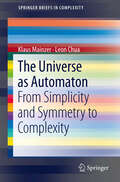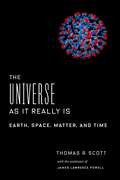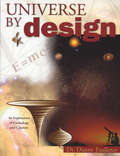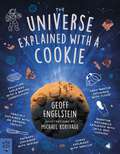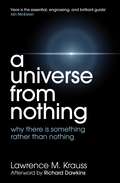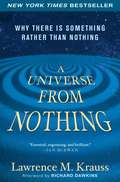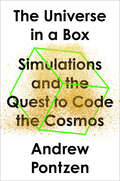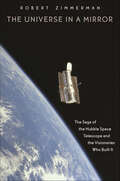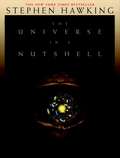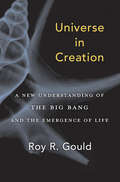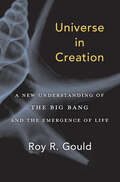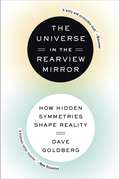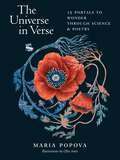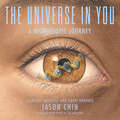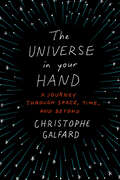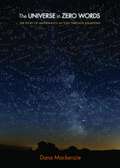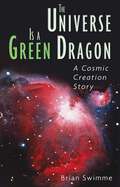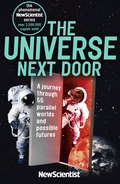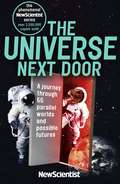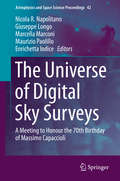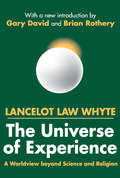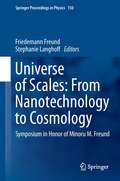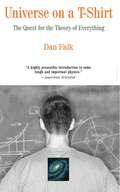- Table View
- List View
The Universe as Automaton
by Leon Chua Klaus MainzerThis Brief is an essay at the interface of philosophy and complexity research, trying to inspire the reader with new ideas and new conceptual developments of cellular automata. Going beyond the numerical experiments of Steven Wolfram, it is argued that cellular automata must be considered complex dynamical systems in their own right, requiring appropriate analytical models in order to find precise answers and predictions in the universe of cellular automata. Indeed, eventually we have to ask whether cellular automata can be considered models of the real world and, conversely, whether there are limits to our modern approach of attributing the world, and the universe for that matter, essentially a digital reality.
The Universe as It Really Is: Earth, Space, Matter, and Time
by Dr Thomas R. ScottThe universe that science reveals to us can seem far outside the comfort zone of the human mind. Subjects near and far open up dizzying vistas, from the infinitesimal to the colossal. Humanity, the unlikely product of uncountable coincidences on unimaginable scales, inhabits a tumultuous universe that extends from our immediate environs to the most distant galaxies and beyond. But when the mind balks at the vertiginous complexity of the universe, science unveils the elegance amid the chaos.In this book, Thomas R. Scott ventures into the known and the unknown to explain our universe and the laws that govern it. The Universe as It Really Is begins with physics and the building blocks of the universe—time, gravity, light, and elementary particles—and chemistry’s ability to explain the interactions among them. Scott, with the assistance of James Lawrence Powell, next tours the earth and atmospheric sciences to explain the forces that shape our planet and then takes off for the stars to describe our place in the cosmos. He provides vivid introductions to our collective scientific inheritance, narrating discoveries such as the shape of the atom and the nature of the nucleus or how we use GPS to measure time and what that has to do with relativity. A clear demonstration of the power of scientific reasoning to bring the incomprehensible within our grasp, The Universe as It Really Is gives an engrossing account of just how much we do understand about the world around us.
Universe By Design
by Danny FaulknerAnd God said, Let there be lights in the firmament of the heaven to divide the day from the night; and let them be for signs, and for seasons, and for days, and years: and God saw that it was good.-Gen. 1:14-18 The universe was created with purpose and reason; and modern science with all of its experiments, exploration, and sophistication has never proven otherwise. In fact, as author Dr. Danny Faulkner makes plain, advanced science argues more for a created cosmology than a big bang. Written for the upper-level student through the well-read layman, Universe by Design explores the universe, explaining its origins and discussing the historical development of cosmology from a creationist viewpoint. Includes: Recent developments in cosmology Explanatory diagrams and illustrations Theories and facts on the origin and expansion of the universe The contributions of Ptolemy, Galileo, Brahe, Newton, Hubble, Einstein, and other famous scientists to the field Thorough discussion and problems with the big bang theory Many examples and analogies to help understand concepts of cosmology Difficulties and critiques of modern cosmology Chapter questions and answers for homeschool study As an excellent supplement to an upper-level homeschool curriculum or the library of an astronomer - amateur or advanced - this book will inform and enlighten the scientific mind.
The Universe Explained with a Cookie: What Baking Cookies Can Teach Us About Quantum Mechanics, Cosmology, Evolution, Chaos, Complexity, and More
by Geoff EngelsteinDid you know that the number of atoms in a cookie is about the same number of stars in the universe? Geoff Engelstein tackles the big questions of the universe and how it works using the sweet and simple chocolate cookie as guide. By exploring what goes into the cookie—the ingredients and the steps—we learn about how everything works, from the tiny world of subatomic particles to galactic clusters. Topics include: The Big Bang Explained with Chocolate ChipsQuantum Mechanics Explained with Milk and CookiesChaos Explained with VanillaAnd more!Filled with fascinating facts and laugh-out-loud moments, it's a richly visual and deeply fascinating scientific exploration of the world. And cookies.
A Universe From Nothing
by Lawrence M. KraussInternationally renowned theoretical physicist and bestselling author Lawrence Krauss offers provocative, revelatory answers to the biggest philosophical questions: Where did our universe come from? Why does anything exist? And how is it all going to end? 'Why is there something rather than nothing?' is the question atheists and scientists are always asked, and until now there has not been a satisfying scientific answer. Today, exciting scientific advances provide new insight into this cosmological mystery: not only can something arise from nothing, but something will always arise from nothing. A mind-bending trip back to the beginning of the beginning, A Universe from Nothing authoritatively presents the most recent evidence that explains how our universe evolved - and the implications for how it's going to end. It will provoke, challenge, and delight readers to look at the most basic underpinnings of existence in a whole new way. In the words of Richard Dawkins: this could potentially be the most important scientific book since Darwin's On the Origin of Species.
A Universe from Nothing
by Lawrence M. Krauss“WHERE DID THE UNIVERSE COME FROM? WHAT WAS THERE BEFORE IT? WHAT WILL THE FUTURE BRING? AND FINALLY, WHY IS THERE SOMETHING RATHER THAN NOTHING?” Lawrence Krauss’s provocative answers to these and other timeless questions in a wildly popular lecture now on YouTube have attracted almost a million viewers. The last of these questions in particular has been at the center of religious and philosophical debates about the existence of God, and it’s the supposed counterargument to anyone who questions the need for God. As Krauss argues, scientists have, however, historically focused on other, more pressing issues—such as figuring out how the universe actually functions, which can ultimately help us to improve the quality of our lives. Now, in a cosmological story that rivets as it enlightens, pioneering theoretical physicist Lawrence Krauss explains the groundbreaking new scientific advances that turn the most basic philosophical questions on their heads. One of the few prominent scientists today to have actively crossed the chasm between science and popular culture, Krauss reveals that modern scienceisaddressing the question of why there is something rather than nothing, with surprising and fascinating results. The staggeringly beautiful experimental observations and mind-bending new theories are all described accessibly inA Universe from Nothing,and they suggest that not onlycansomething arise from nothing, something willalwaysarise from nothing. With his characteristic wry humor and wonderfully clear explanations, Krauss takes us back to the beginning of the beginning,presenting the most recent evidence for how our universe evolved—and the implications for how it’s going to end. It will provoke, challenge, and delight readers as it looks at the most basic underpinnings of existence in a whole new way. And this knowledge that our universe will be quite different in the future from today has profound implications and directly affects how we live in the present. As Richard Dawkins has described it: This could potentially be the most important scientific book with implications for supernaturalism since Darwin. A fascinating antidote to outmoded philosophical and religious thinking,A Universe from Nothingis a provocative, game-changing entry into the debate about the existence of God and everything that exists. “Forget Jesus,” Krauss has argued, “the stars died so you could be born. ”
A Universe from Nothing: Why There Is Something Rather than Nothing (Playaway Adult Nonfiction Ser.)
by Lawrence M. Krauss Richard DawkinsBestselling author and acclaimed physicist Lawrence Krauss offers a paradigm-shifting view of how everything that exists came to be in the first place."Where did the universe come from? What was there before it? What will the future bring? And finally, why is there something rather than nothing?"One of the few prominent scientists today to have crossed the chasm between science and popular culture, Krauss describes the staggeringly beautiful experimental observations and mind-bending new theories that demonstrate not only can something arise from nothing, something will always arise from nothing. With a new preface about the significance of the discovery of the Higgs particle, A Universe from Nothing uses Krauss's characteristic wry humor and wonderfully clear explanations to take us back to the beginning of the beginning, presenting the most recent evidence for how our universe evolved--and the implications for how it's going to end. Provocative, challenging, and delightfully readable, this is a game-changing look at the most basic underpinning of existence and a powerful antidote to outmoded philosophical, religious, and scientific thinking.
The Universe in a Box: Simulations and the Quest to Code the Cosmos
by Andrew PontzenScientists are using simulations to recreate the universe, revealing the hidden nature of reality.Cosmology is a tricky science—no one can make their own stars, planets, or galaxies to test its theories. But over the last few decades a new kind of physics has emerged to fill the gap between theory and experimentation. Harnessing the power of modern supercomputers, cosmologists have built simulations that offer profound insights into the deep history of our universe, allowing centuries-old ideas to be tested for the first time. Today, physicists are translating their ideas and equations into code, finding that there is just as much to be learned from computers as experiments in laboratories. In The Universe in a Box, cosmologist Andrew Pontzen explains how physicists model the universe&’s most exotic phenomena, from black holes and colliding galaxies to dark matter and quantum entanglement, enabling them to study the evolution of virtual worlds and to shed new light on our reality. But simulations don&’t just allow experimentation with the cosmos; they are also essential to myriad disciplines like weather forecasting, epidemiology, neuroscience, financial planning, airplane design, and special effects for summer blockbusters. Crafting these simulations involves tough compromises and expert knowledge. Simulation is itself a whole new branch of science, one that we are only just beginning to appreciate and understand. The story of simulations is the thrilling history of how we arrived at our current knowledge of the world around us, and it provides a sneak peek at what we may discover next.
The Universe in a Mirror: The Saga of the Hubble Space Telescope and the Visionaries Who Built It
by Robert ZimmermanThe Hubble Space Telescope has produced the most stunning images of the cosmos humanity has ever seen. It has transformed our understanding of the universe around us, revealing new information about its age and evolution, the life cycle of stars, and the very existence of black holes, among other startling discoveries. But it took an amazing amount of work and perseverance to get the first space telescope up and running. The Universe in a Mirror tells the story of this telescope and the visionaries responsible for its extraordinary accomplishments. Robert Zimmerman takes readers behind the scenes of one of the most ambitious scientific instruments ever sent into space. After World War II, astronomer Lyman Spitzer and a handful of scientists waged a fifty-year struggle to build the first space telescope capable of seeing beyond Earth's atmospheric veil. Zimmerman shows how many of the telescope's advocates sacrificed careers and family to get it launched, and how others devoted their lives to Hubble only to have their hopes and reputations shattered when its mirror was found to be flawed. This is the story of an idea that would not die--and of the dauntless human spirit. Illustrated with striking color images, The Universe in a Mirror describes the heated battles between scientists and bureaucrats, the perseverance of astronauts to repair and maintain the telescope, and much more. Hubble, and the men and women behind it, opened a rare window onto the universe, dazzling humanity with sights never before seen. This book tells their remarkable story. A new afterword updates the reader on the May 2009 Hubble service mission and looks to the future of astronomy, including the prospect of a new space telescope to replace Hubble.
The Universe in a Nutshell
by Stephen HawkingStephen Hawking's phenomenal, multimillion-copy bestseller, A Brief History of Time, introduced the ideas of this brilliant theoretical physicist to readers all over the world. Now, in a major publishing event, Hawking returns with a lavishly illustrated sequel that unravels the mysteries of the major breakthroughs that have occurred in the years since the release of his acclaimed first book. The Universe in a Nutshell * Quantum mechanics * M-theory * General relativity * 11-dimensional supergravity * 10-dimensional membranes * Superstrings * P-branes * Black holes One of the most influential thinkers of our time, Stephen Hawking is an intellectual icon, known not only for the adventurousness of his ideas but for the clarity and wit with which he expresses them. In this new book Hawking takes us to the cutting edge of theoretical physics, where truth is often stranger than fiction, to explain in layman's terms the principles that control our universe. Like many in the community of theoretical physicists, Professor Hawking is seeking to uncover the grail of science -- the elusive Theory of Everything that lies at the heart of the cosmos. In his accessible and often playful style, he guides us on his search to uncover the secrets of the universe -- from supergravity to supersymmetry, from quantum theory to M-theory, from holography to duality. He takes us to the wild frontiers of science, where superstring theory and p-branes may hold the final clue to the puzzle. And he lets us behind the scenes of one of his most exciting intellectual adventures as he seeks "to combine Einstein's General Theory of Relativity and Richard Feynman's idea of multiple histories into one complete unified theory that will describe everything that happens in the universe." With characteristic exuberance, Professor Hawking invites us to be fellow travelers on this extraordinary voyage through space-time. Copious four-color illustrations help clarify this journey into a surreal wonderland where particles, sheets, and strings move in eleven dimensions; where black holes evaporate and disappear, taking their secret with them; and where the original cosmic seed from which our own universe sprang was a tiny nut. The Universe in a Nutshell is essential reading for all of us who want to understand the universe in which we live. Like its companion volume, A Brief History of Time, it conveys the excitement felt within the scientific community as the secrets of the cosmos reveal themselves.
Universe in Creation: A New Understanding of the Big Bang and the Emergence of Life
by Roy R. GouldWe know the universe has a history, but does it also have a story of self-creation to tell? Yes, in Roy R. Gould’s account. He offers a compelling narrative of how the universe—with no instruction other than its own laws—evolved into billions of galaxies and gave rise to life, including humans who have been trying for millennia to comprehend it. Far from being a random accident, the universe is hard at work, extracting order from chaos. Making use of the best current science, Gould turns what many assume to be true about the universe on its head. The cosmos expands inward, not outward. Gravity can drive things apart, not merely together. And the universe seems to defy entropy as it becomes more ordered, rather than the other way around. Strangest of all, the universe is exquisitely hospitable to life, despite its being constructed from undistinguished atoms and a few unexceptional rules of behavior. Universe in Creation explores whether the emergence of life, rather than being a mere cosmic afterthought, may be written into the most basic laws of nature. Offering a fresh take on what brought the world—and us—into being, Gould helps us see the universe as the master of its own creation, not tethered to a singular event but burgeoning as new space and energy continuously stream into existence. It is a very old story, as yet unfinished, with plotlines that twist and churn through infinite space and time.
Universe in Creation: A New Understanding of the Big Bang and the Emergence of Life
by Roy R. Gould“In a unique take on the cosmos, Gould makes the case that the emergence of a great many things are not only pre-ordained, but predictable.” (Forbes)We know the universe has a history, but does it also have a story of self-creation to tell? Yes, in Roy R. Gould’s account. He offers a compelling narrative of how the universe?with no instruction other than its own laws?evolved into billions of galaxies and gave rise to life. Far from being a random accident, the universe is hard at work, extracting order from chaos.Making use of the best current science, Gould turns what many assume to be true about the universe on its head. The cosmos expands inward, not outward. Gravity can drive things apart, not merely together. And the universe seems to defy entropy as it becomes more ordered, rather than the other way around. Strangest of all, the universe is exquisitely hospitable to life, despite its being constructed from undistinguished atoms and a few unexceptional rules of behavior. Universe in Creation explores whether the emergence of life, rather than being a mere cosmic afterthought, may be written into the most basic laws of nature.“A must-have for all avid popular science fans.” —Astronomy Now“Gould . . . proposes a fascinating thesis about life’s emergence in this eloquent debut” —Publishers Weekly“A joyous romp through a cosmos full of wonders.” —Roald Hoffmann, Nobel Laureate and author of Beyond the Finite“Exciting, original, and extremely well written.” —Avi Loeb, Harvard University, New York Times bestselling author of Extraterrestrial“Fascinating. . . . Gould artfully describes various . . . highlights in universal history, like the formation of stars and planets. Many of these moments are majestic.” —New Republic
The Universe in the Rearview Mirror
by Dave GoldbergA physicist speeds across space, time and everything in between showing that our elegant universe--from the Higgs boson to antimatter to the most massive group of galaxies--is shaped by hidden symmetries that have driven all our recent discoveries about the universe and all the ones to come. Why is the sky dark at night? Is it possible to build a shrink-ray gun? If there is antimatter, can there be antipeople? Why are past, present, and future our only options? Are time and space like a butterfly's wings? No one but Dave Goldberg, the coolest nerd physicist on the planet, could give a hyper drive tour of the universe like this one. Not only does he answer the questions your stoner friends came up with in college, but he also reveals the most profound discoveries of physics with infectious, Carl Sagan-like enthusiasm and accessibility. Goldberg's narrative is populated with giants from the history of physics, and the biggest turns out to be an unsung genius and Nazi holocaust escapee named Emmy Noether--the other Einstein. She was unrecognized, even unpaid, throughout most of her career simply because she was a woman. Nevertheless, her theorem relating conservation laws to symmetries is widely regarded to be as important as Einstein's notion of the speed of light. Einstein himself said she was "the most significant creative mathematical genius thus far produced since the higher education of women began." Symmetry is the unsung great idea behind all the big physics of the last one hundred years--and what lies ahead. In this book, Goldberg makes mindbending science not just comprehensible but gripping. Fasten your seat belt.
The Universe in Verse: 15 Portals to Wonder through Science & Poetry
by Maria PopovaIn this book of illustrated essays, Maria Popova, creator of The Marginalian, presents a celebration of the human search for truth and beauty through the lenses of science and poetry. Poetry and science, as Popova writes in her introduction, "are instruments for knowing the world more intimately and loving it more deeply." In 15 short essays on subjects ranging from the mystery of dark matter and the infinity of pi to the resilience of trees and the intelligence of octopuses, Popova tells the stories of scientific searching and discovery. These stories are interwoven with details from the very real and human lives of scientists—many of them women, many underrecognized—and poets inspired by the same questions and the beauty they reveal. Each essay is paired with a poem reflecting its subject by poets ranging from Emily Dickinson, W. H. Auden, and Edna St. Vincent Millay to Maya Angelou, Diane Ackerman, and Tracy K. Smith, and is stunningly illustrated by celebrated artist Ofra Amit. Together, they wake us to a "reality aglow with wonder."
The Universe in You: A Microscopic Journey
by Jason ChinJason Chin, winner of the Caldecott Medal for Watercress, dives into the microscopic building blocks of life in this companion to the award-winning Your Place in the Universe.In Your Place in the Universe, Jason Chin zoomed outward, from our planet, solar system, and galaxy to the outer reaches of the observable universe. Now, Chin reverses course, zooming in past our skin to our cells, molecules, and atoms, all the way down to particles so small we can&’t yet even measure them. Like its companion, The Universe in You is a mind-boggling adventure that makes complex science accessible and enjoyable to readers of any age.Impeccably researched, wholly engrossing, and with extensive backmatter for additional learning, The Universe in You is another knockout from the award-winning creator of Redwoods, Grand Canyon, and other distinguished works of nonfiction for young readers. A School Library Journal Best Book of the YearA Junior Library Guild Gold Standard Selection
The Universe in Your Hand: A Journey Through Space, Time, and Beyond
by Christophe Galfard"If Ms. Frizzle were a physics student of Stephen Hawking, she might have written THE UNIVERSE IN YOUR HAND, a wild tour through the reaches of time and space, from the interior of a proton to the Big Bang to the rough suburbs of a black hole. It's friendly, excitable, erudite, and cosmic."—Jordan Ellenberg, New York Times besteselling author of How Not To Be WrongQuantum physics, black holes, string theory, the Big Bang, dark matter, dark energy, parallel universes: even if we are interested in these fundamental concepts of our world, their language is the language of math. Which means that despite our best intentions of finally grasping, say, Einstein's Theory of General Relativity, most of us are quickly brought up short by a snarl of nasty equations or an incomprehensible graph. Christophe Galfard's mission in life is to spread modern scientific ideas to the general public in entertaining ways. Using his considerable skills as a brilliant theoretical physicist and successful young adult author, The Universe in Your Hand employs the immediacy of simple, direct language to show us, not explain to us, the theories that underpin everything we know about our universe. To understand what happens to a dying star, we are asked to picture ourselves floating in space in front of it. To get acquainted with the quantum world, we are shrunk to the size of an atom and then taken on a journey. Employing everyday similes and metaphors, addressing the reader directly, and writing stories rather than equations renders these astoundingly complex ideas in an immediate and visceral way. Utterly captivating and entirely unique, The Universe in Your Hand will find its place among other classics in the field.
The Universe in Zero Words
by Dana MackenzieMost popular books about science, and even about mathematics, tiptoe around equations as if they were something to be hidden from the reader's tender eyes. Dana Mackenzie starts from the opposite premise: He celebrates equations. No history of art would be complete without pictures. Why, then, should a history of mathematics--the universal language of science--keep the masterpieces of the subject hidden behind a veil?The Universe in Zero Words tells the history of twenty-four great and beautiful equations that have shaped mathematics, science, and society--from the elementary (1+1=2) to the sophisticated (the Black-Scholes formula for financial derivatives), and from the famous (E=mc2) to the arcane (Hamilton's quaternion equations). Mackenzie, who has been called "a popular-science ace" by Booklist magazine, lucidly explains what each equation means, who discovered it (and how), and how it has affected our lives.Illustrated in color throughout, the book tells the human and often-surprising stories behind the invention or discovery of the equations, from how a bad cigar changed the course of quantum mechanics to why whales (if they could communicate with us) would teach us a totally different concept of geometry. At the same time, the book shows why these equations have something timeless to say about the universe, and how they do it with an economy (zero words) that no other form of human expression can match.The Universe in Zero Words is the ultimate introduction and guide to equations that have changed the world.
The Universe Is a Green Dragon: A Cosmic Creation Story
by Brian SwimmeCommunicating his ideas in the form of a classical dialogue between a youth and a wise elder, cosmologist Brian Swimme crafts a fascinating exploration into the creativity suffusing the universe. His explication of the fundamental powers of the cosmos is mystical and ecstatic and points directly to the need to activate one&’s own creative powers.
Universe Lost: Reclaiming a Christian World View
by Stuart CookThe author draws his own personal interpretation of reality from the Bible.
The Universe Next Door: A Journey Through 55 Parallel Worlds and Possible Futures
by New ScientistIt's lucky you're here. But for a series of choices, accidents and coincidences - any of which could have gone otherwise - your life would have been very different. The same goes for reality. We live in just one of many possible worlds - but we can imagine parallel universes in which dinosaurs still rule the Earth, the Russians got to the moon first, everyone's a vegetarian or time itself flows backwards. And that's just for starters. What if the laws of physics were different? What if robots become smarter than us? Or, if every human on the planet simply vanished tomorrow? The answers to these questions aren't just fun to consider, but reveal deep truths about our own universe.Join New Scientist on a thrilling journey through dozens of incredible but perfectly possible alternative realities, thought experiments and counterfactual histories - each shining a surprising and unexpected spotlight on life as we know it.
The Universe Next Door: A Journey through 55 Alternative Realities, Parallel Worlds and Possible Futures
by New ScientistA journey through 55 alternative realities, parallel worlds and possible futures.It's lucky you're here. But for a series of incredible coincidences and roads not taken, your life could be very different. The same goes for reality. We live in just one of many possible worlds. In others, dinosaurs still rule the Earth, the Russians got to the Moon first, time flows backwards and everyone is vegetarian.And that's just for starters. What if the laws of physics were different? If we really did live in a multiverse? If robots became smarter than us? If humans were wiped off the face of the planet?Join New Scientist on a thrilling journey through these and dozens of other incredible but perfectly possible alternative realities, thought experiments and counterfactual histories -each shining a surprising and unexpected spotlight on life as we know it.
The Universe of Digital Sky Surveys
by Nicola R. Napolitano Giuseppe Longo Marcella Marconi Maurizio Paolillo Enrichetta IodiceThese are the proceedings of a meeting in honour of Massimo Capaccioli at the occasion of his 70th birthday. The conference aimed at summarizing the results from the main current and past digital sky survey projects and at discussing how these can be used to inspire ongoing projects and better plan the future ones. Over the last decades, digital sky surveys performed with dedicated telescopes and finely-tuned wide-field cameras, have revolutionized astronomy. They have become the main tool to investigate the nearby and far away universe, thus providing new insights in the understanding of the galaxy structure and assembly across time, the dark components of the universe, as well as the history of our own galaxy. They have also opened the time domain leading to a new understanding of the transient phenomena in the universe. By providing public access to top quality data, digital surveys have also changed the everyday practice of astronomers who have become less dependent on direct access to large observing facilities. The full scientific exploitation of these surveys has also triggered significant advances in both space and ground based technology and in the field of multi-object spectroscopy. The various sections of this book are devoted to different relevant aspects of astrophysics in the era of digital sky surveys and include both review and shorter, more focused contributions.
The Universe of Experience: A Worldview Beyond Science and Religion
by Lancelot WhyteModern experience forces philosophy and social thought to confront the basic problems of value. Is this life worth caring about? How can we find a way between the deceit of fanatical belief and despair? In the view of Lancelot Law Whyte, the essential challenge to mankind today is an underlying nihilism promoting violence and frustrating sane policies on major social issues. Avoiding the seductive trap of utopianism, Whyte approaches this challenge by defining the terms of a potentially worldwide consensus of heart, mind, and will.In this volume, Whyte addresses the problems of despair and fanatical religious or political reactions that arise from despair. He begins with the basic problem of nihilism, or the tendency toward pessimism and self/other destruction that faces us at this point in human development. Rejecting all forms of religious sectarianism as separating God from the individual and people from each other, he discerns, as well, a fundamental disunity and incompleteness among the sciences that render them incapable of supplying a guide to social order. Whyte sees the universe as an arena of conflict between tendencies toward order and disorder with the former dominating and containing the latter. In place of science and traditional religion, Whyte draws upon what he sees as the unconscious tradition, a genius of the community, shared in degrees by all its members, that points mankind toward a better way of living.Whyte does not posit a state of perfection, nor does he suggest the end of human suffering. Instead he suggests that an integrated state of being, freed from the old mind-body dualism will be a new starting point in human evolution. Accessibly written and firmly rooted in science, philosophy, and history, The Universe of Experience will be of interest to sociologists, psychologists, and philosophers.
Universe of Scales: From Nanotechnology to Cosmology
by Friedemann Freund Stephanie LanghoffThe presentations at this NASA-hosted Symposium in honor of Mino Freund will touch upon the fields, to which his prolific mind has made significant contributions. These include low temperature physics, cosmology, and nanotechnology with its wide-ranging applicability to material science, neuroscience, Earth sciences and satellite technology. To learn more about Mino's career you can download the 'Tribute' http: //multimedia. seti. org/mino/Tribute. pdf which outlines his journey from (i) low-temperature physics and superconductivity at the ETH Zrich to (ii) building one remarkable milliKelvin refrigerator for the US-Japan IRTS mission at UC Berkeley and ISAS in Japan to (iii) a decade in cosmology, to (iv) being on the micro-bolometer team at NASA Goddard for the HAWC instrument on SOFIA, to (v) developing at AFRL the nanotechnology portfolio for the entire Air Force. This was followed by six years at the NASA Ames Research Center, where Mino formulated his far-ahead ideas about swarms of capable nanosats circling the Earth, which have since started to become a reality. He engaged in a broad range of nanotechnology projects, including novel applications in neuroscience well before he himself was struck by the deadly brain tumor. "
Universe on a T-Shirt: The Quest for the Theory of Everything
by Dan FalkNo scientific quest is as compelling as the search for the key to understand the universe--the elusive unified "Theory of Everything"--a theory so concise it could fit on a T-shirt. Lively and thought-provoking, Universe on a T-Shirt tells the fascinating story of the search for the Holy Grail of physics.Dan Falk places this intriguing story in its historical context, tracing the quest from ancient Greece to the breakthroughs of Newton, Maxwell, and Einstein, to the excitement over string theory and today's efforts to merge quantum theory with general relativity. With as much emphasis on history as on science, Falk's accessible approach is ideal for anyone intrigued by the advances in modern physics but still wondering what theoretical physicists are searching for, and why. Today's physicists use sophisticated methods, but their goal--the search for simplicity--has not changed since the time of the ancient Greeks. Universe on a T-Shirt is filled with quirky personalities, brilliant minds, and bold ideas--high science and high drama."An admirably concise and comprehensive overview of cosmology . . . [that] offers intriguing insights into the philosophic and personal outlooks motivating the scientists involved, from the ancient Greeks through Newton and Einstein . . . [and] Stephen Hawking and Ed Witten."--Booklist
